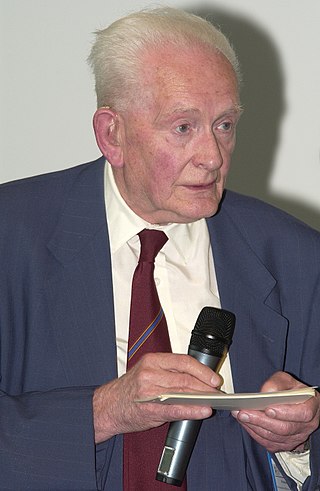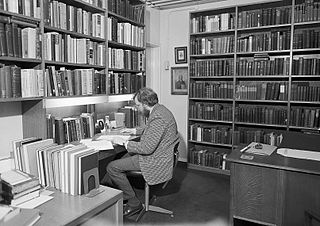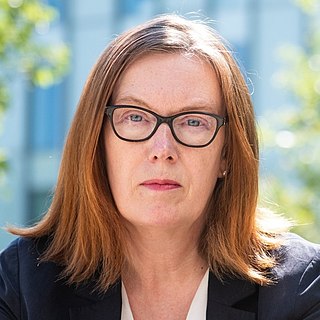
The 1918–1920 flu pandemic, also known as the Great Influenza epidemic or by the common misnomer Spanish flu, was an exceptionally deadly global influenza pandemic caused by the H1N1 influenza A virus. The earliest documented case was March 1918 in the state of Kansas in the United States, with further cases recorded in France, Germany and the United Kingdom in April. Two years later, nearly a third of the global population, or an estimated 500 million people, had been infected in four successive waves. Estimates of deaths range from 17 million to 50 million, and possibly as high as 100 million, making it one of the deadliest pandemics in history.
Sir Richard Brook Sykes is a British microbiologist, the chair of the Royal Institution, the UK Stem Cell Foundation, and the trustees at King Edward VII's Hospital, and chancellor of Brunel University. As of June 2021, he is chair of the UK's Vaccine Taskforce, where he is responsible for overseeing the delivery of the COVID-19 vaccination programme, including preparations for booster programmes and encouraging vaccine innovation in the UK.

The Royal College of Physicians of London, commonly referred to simply as the Royal College of Physicians (RCP) is a British professional membership body dedicated to improving the practice of medicine, chiefly through the accreditation of physicians by examination, and now also Physicians Assistants without examination. Founded by royal charter from King Henry VIII in 1518, as the College of Physicians, the RCP is the oldest medical college in England.
Roy Sydney Porter, FBA was a British historian known for his work on the history of medicine. He retired in 2001 from the director of the Wellcome Institute for the History of Medicine at University College London (UCL).

The Wellcome Trust is a charitable foundation focused on health research based in London, in the United Kingdom. It was established in 1936 with legacies from the pharmaceutical magnate Henry Wellcome to fund research to improve human and animal health. The aim of the Trust is to "support science to solve the urgent health challenges facing everyone." It had a financial endowment of £29.1 billion in 2020, making it the fourth wealthiest charitable foundation in the world. In 2012, the Wellcome Trust was described by the Financial Times as the United Kingdom's largest provider of non-governmental funding for scientific research, and one of the largest providers in the world. According to their annual report, the Wellcome Trust spent GBP £1.1Bn on charitable activities across their 2019/2020 financial year. According to the OECD, the Wellcome Trust's financing for 2019 development increased by 22% to US$327 million.
Kevin Jeremy San Yoong Fong is a British doctor and broadcaster. He is a consultant anaesthetist and anaesthetic lead for Major Incident Planning at UCL Hospitals. He is a professor at University College London where he organises and runs an undergraduate course Extreme Environment Physiology. Fong also serves as a prehospital doctor with Air Ambulance Kent Surrey Sussex and specialises in space medicine in the UK and is the co-director of the Centre for Aviation Space and Extreme Environment Medicine, University College London.

John Rowland Mallard OBE FRSE FREng was an English physicist and professor of Medical Physics at the University of Aberdeen from 1965 until his retirement in 1992. He was known for setting up and leading the team that developed the first magnetic resonance imaging (MRI) full body scanner and, in particular, positron emission tomography (PET). He was born in Kingsthorpe, Northampton, England.

Sarah Hughes, was a British journalist, known to her readers by the pseudonym 'Lady Sarah'. She wrote for several British national newspapers including The Telegraph, The Independent, inews, and the Observer and Guardian, in which she published regular reviews of television series including Line of Duty, Peaky Blinders, Indian Summers and the Game of Thrones.
Thomas Solomon is Professor of Neurology at the University of Liverpool, director of The Pandemic Institute and director of the National Institute for Health and Care Research (NIHR) Health Protection Research Unit in Emerging and Zoonotic Infections. He is also Vice President (International) of the Academy of Medical Sciences.
Dame Anne Mandall Johnson DBE FMedSci is a British epidemiologist, known for her work in public health, especially the areas of HIV, sexually transmitted infections and infectious diseases.
Medical History is a peer-reviewed academic journal covering the history of medicine. It was established in 1957. The journal is edited by Sanjoy Bhattacharya and is published by Cambridge University Press.

The British Society for the History of Medicine (BSHM) is an umbrella organisation of History of medicine societies throughout the United Kingdom, with particular representation to the International Society for the History of Medicine. It has grown from the original four affiliated societies in 1965; the Section for the History of Medicine, The Royal Society of Medicine, London, Osler Club of London, Faculty of the History of Medicine and Pharmacy and the Scottish Society of the History of Medicine, to twenty affiliated societies in 2018.

William F. Bynum is a British emeritus professor in history of medicine. For most of his career, he has worked at the Wellcome Trust Centre for the History of Medicine, University College London. He has frequently collaborated with British historian Roy Porter.

The History of Medicine Society (HoMS), at the Royal Society of Medicine (RSM), London, was founded by Sir William Osler in 1912, and later became one of the four founder medical societies of the British Society for the History of Medicine.

Edwin Sisterton Clarke FRCP was a British neurologist and medical historian, best remembered for his role as Director of the Wellcome Institute for the History of Medicine, when he succeeded Noël Poynter and oversaw the transfer of the Wellcome museum to the Science museum, helped establish an intercalated BSc degree in the history of medicine for medical students and edited the journal Medical History.

Frederick Noël Lawrence Poynter FLA was a British librarian and medical historian who served as director of the Wellcome Institute for the History of Medicine from 1964 to 1973.

The Poynter Lecture is given every two years at the British Society for the History of Medicine in memory of Noël Poynter, past president of BSHM, who was Director of the Wellcome Institute for the History of Medicine from 1964 to 1973.

Dame Sarah Catherine Gilbert FRS is an English vaccinologist who is a Professor of Vaccinology at the University of Oxford and co-founder of Vaccitech. She specialises in the development of vaccines against influenza and emerging viral pathogens. She led the development and testing of the universal flu vaccine, which underwent clinical trials in 2011.
The Scientific Advisory Group for Emergencies (SAGE) is a British Government body that advises central government in emergencies. It is usually chaired by the United Kingdom's Chief Scientific Adviser. Specialists from academia and industry, along with experts from within government, make up the participation, which will vary depending on the emergency. SAGE gained public prominence for its role in the 2020 COVID-19 pandemic in the United Kingdom.
William Royal Stokes was Baltimore City's bacteriologist. While investigating the 1929–1930 psittacosis pandemic, he contracted psittacosis and died. An annual lecture, a library dedicated to bacteriology and a street are named for him.











